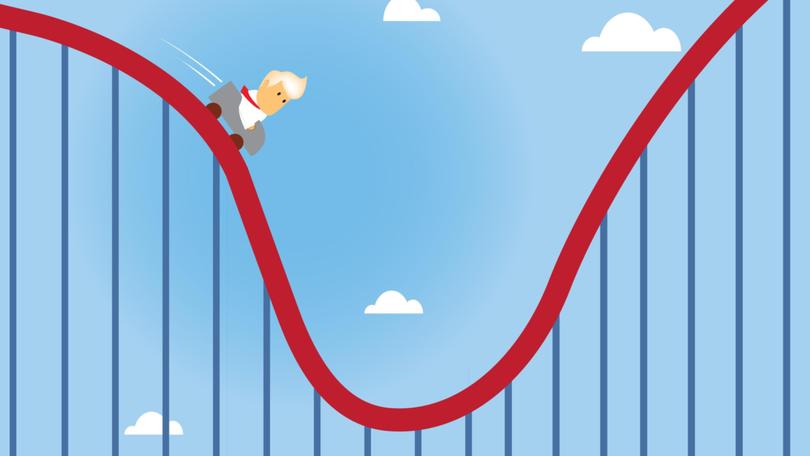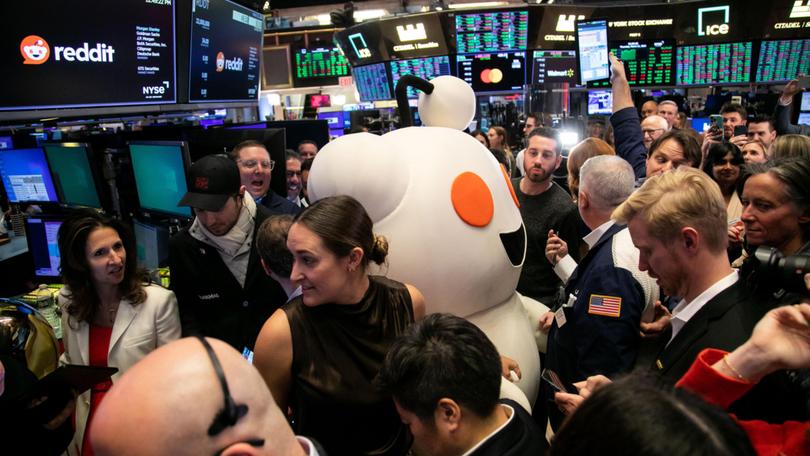THE ECONOMIST: ‘Buy the dip’ investment trend keeps markets from crashing during Donald Trump’s wild ride
THE ECONOMIST: As Donald Trump’s erratic policy announcements send investors on a wild ride, a modern breed of buyers is providing liquidity in a pattern that is changing stock markets

Stockmarkets appear to have recovered their poise. By May 2 America’s S&P 500 index had climbed back to its level of a month earlier, just before President Donald Trump’s “Liberation Day” tariff salvo.
If the S&P’s plunge was shocking — a fall of 12 per cent in just four trading days — the rebound was, too. Mr Trump’s decision to pause many of his duties certainly helped. So, it seems, did retail investors.
Even as markets plunged by five per cent on the day after Mr Trump’s announcement, retail investors refused to pull out their money. Instead, they poured in a net $US5billion ($9.2b). Over the next week, as prices slid still further, they deployed additional billions, snapping up everything from tech giants such as Amazon and Nvidia to exchange-traded funds tracking the whole market. If retail investors were fazed by President Trump’s tariffs, they had a funny way of showing it.
Sign up to The Nightly's newsletters.
Get the first look at the digital newspaper, curated daily stories and breaking headlines delivered to your inbox.
By continuing you agree to our Terms and Privacy Policy.In decades gone by, such investors were derided as bandwagon-jumpers who extrapolated future trends from past performance. Today they are contrarians. Amateur investors regularly pile into the market on its most difficult days.
Investing forums, notably Reddit’s r/WallStreetBets, throb to a drumbeat of encouragement for participants to “buy the dip”. Whereas institutional investors may be forced by risk managers to unwind trades as prices slide, retail investors provide liquidity during sell-offs — a pattern that is changing modern stockmarkets.
The “momentum” stereotype was not without foundation. In 2014 Robin Greenwood and Andrei Shleifer, both of Harvard University, found that investors did not expect higher returns when stocks dropped — as theory would suggest they should — but lower ones. Indeed, flows into mutual funds still track broader market sentiment, and money heads to the best-performing managers.
The logic that what rose yesterday will surely rise tomorrow remains powerful: witness appetite in recent years for bitcoin, Gamestop and Cathie Wood’s tech-heavy ARK fund.
At the same time, there have long been phenomena pulling in the opposite direction.
First among them is rebalancing. Many savers aim for a 60‑40 mix of, for example, $US600 in equities, $US400 in Treasuries.
A slide of 20 per cent in stocks and a bond gain of two per cent leaves equities at $US480 and bonds at $US408, a 54-46 split. Restoring the 60‑40 divide means buying the asset that just fell.

Psychology plays a similar role: one of the most widely documented biases is the “disposition effect”, where investors sell winners and hold losers. A reluctance to realise losses may appear as contrarian behaviour.
These forces cannot explain recent rallies, however. The disposition effect concerns selling, not scooping up bargains, and rebalancing is usually a quarterly or annual ritual. Neither much reflects sentiment, let alone the Reddit chorus. Instead, retail investors appear to have developed a self-fulfilling belief that there will almost always be a snap-back.
According to theory, when prices plunge, either fundamentals have worsened or investors have become more skittish; in the latter case, those with cash to spare should pocket a premium for providing liquidity and shouldering the risk. (Empirical evidence suggests the theory does hold over long investment horizons.)
Timing may offer a clue as to how to reconcile the data of Messrs Greenwood and Shleifer with investor behaviour during the plunge that followed Mr Trump’s tariffs. A “buy the dip” approach is frequently invoked to justify scooping up assets that have fallen in price in recent days or weeks, whereas evidence on surveys and fund flows tends to capture behaviour in response to months or years of performance.
And there may now be more short-term traders than in the past, owing to the explosion of app-based, instant-trading platforms, including EToro and Robinhood. In 2019 such platforms had $US14b of assets under custody; that figure has now reached $US180b. Robinhood’s average client is around 15 years younger than that of Vanguard, which provides staid index investing.
Growing numbers of ultra-rich investors may also play a role. Although there are still relatively few in total, they account for a larger share of “household” flows — and are eager to provide liquidity when the market drops.

According to Xavier Gabaix of Harvard and co-authors, affluent investors with less than $US30m typically take money out of stocks when markets fall. Those with over $US30m step in.
Paradoxically, therefore, the ultimate consequence of concentrated wealth, internet mania and contrarian, app-based trading may be a calmer day-to-day market.
Bullish retail sentiment may inflate valuations over the long haul, but without billions of dollars of inflows to stabilise the market in April, stocks would have surely fallen further amid even greater volatility.
Dip‑buyers were stabilisers. With stocks having recovered they also look — for the moment, at least — like sages.
Originally published as Buy the dip: the trend that keeps stocks from crashing
